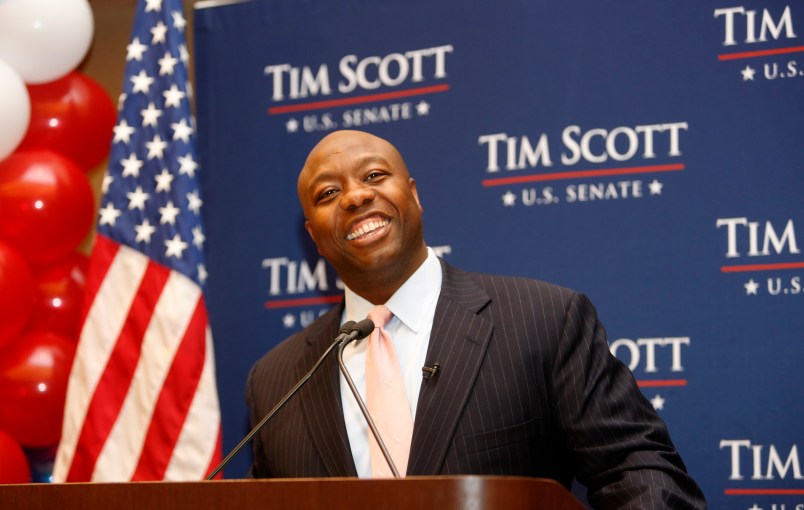Like their peers across the country, when some South Carolina voters walked out of the polling station this week, they were asked to take an exit poll. But some of the questions were a little different — things like, “Blacks are getting too demanding in their push for equal rights. Agree or disagree?”
And South Carolinans weren’t happy about it.
It wasn’t the Ku Klux Klan canvassing voters in the Palmetto State. It was political scientists from Clemson University and the University of South Carolina. The irony is that they wanted to seize on a historical moment — the election of Sen. Tim Scott (R-SC), the first black senator to be elected in the South since Reconstruction — to test whether racial animus was still a factor for voters.
But in doing so, they managed to stir up a lot of backlash. “This is shameful!” tweeted one person who received the survey. Another, according to WSPA in Greenville, said the questions were “overtly racist.”
It was a perfect opportunity, David Woodard, political scientist at Clemson University, told TPM in an interview, because Scott and Sen. Lindsay Graham (R-SC) were up for re-election in the same year. Scott was appointed to his seat in 2013 and had to run in a special election in 2014 to serve the last two years of Sen. Jim DeMint’s term.
“It’s rare to get two senators running in the same state on the same day. Unprecedented, really,” he said. “So I thought, ‘We’ve got Haley’s Comet here. We’ve got to measure it.'”
Woodard and his partner, an African-American doctoral candidate at the University of South Carolina, Paul White Jr., predicted — rightly — that Scott (61 percent) would win more votes than Graham (54 percent). They suspected that they would then find people who would agree with some of the questions posed to them about race, while also revealing that they voted for Scott.
That would then test the established literature that, as Woodard put it: “People vote for racial reasons in the South.”
“A lot of people would confirm themselves on the racial measures. ‘Well yeah I do think blacks are too demanding,'” he explained. “But then what did they do? They turn around and voted for Tim Scott!”
“The literature says that people vote for racial reasons in the South. We think they don’t,” Woodard said. “We think they vote for personalities and ideologies. We’re not saying they’re totally colorblind. That would be crazy. But we just don’t think race is as great an explainer as the literature says it is.”
Woodard and White didn’t make up the questions either. They came from a psychological test that dates back to the 1980s and measures racism. But what they didn’t account for, Woodard said, is the visceral reaction that people would have to being asked these questions to their face — rather than over the phone, as many past surveys on racial sentiments have been done.
And the backlash seemed to come from both sides of the political spectrum.
“It’s always 20/20 hindsight,” he said. “But we should have been more aware that the face-to-face asking of these questions was going to be more difficult. We didn’t dream them up, but of course, that didn’t mean we should have asked them.”
Perhaps the deepest irony is that the initial data suggests that their suspicions were right. Woodard and White plan to eventually publish their findings in an academic journal and they are still evaluating the 400 questionnaires that were filled out. But a cursory look shows that their theory about race and voting in the South proved true.
“We confirmed our hypothesis,” Woodard said. But they got a lot of grief for it.







Hey, SC Republican voters, some of those questions hitting a little too close to home?
Yeah, how dare those uppity blacks think they deserve equal rights. Who do they think they are, right teabags?
I guess Nixon never employed the “Southern Strategy.” I guess Reagan was sincere when he launched his Presidential campaign in Philadelphia, MS and railed for states’ rights. I guess southerners are earnestly concerned about rampant voter fraud and thus want voter ID laws. I guess closing down polling locations, limiting early voting opportunities are mere budget decisions. Don’t piss on me and tell me its raining.
Racists are more than willing to vote for a minority as long as that minority supports their agenda of disenfranchising and disempowering minorities.
They don’t mind BEING racists; they mind being CALLED racist.
“They turn around and voted for Tim Scott!”
Who was running against who ?Never even heard of the race in South Carolina and IMHO it should have been news since he was given the seat by Demint,and he was the first Black Senator from South Carolina.Heard about Hagan ,Grimes and Nunn and their races.